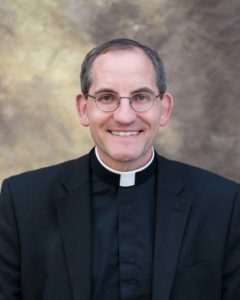 When I was a newly ordained priest, I spent a fair amount of time teaching in the Catholic high school connected to the parish to which I was assigned. At the end of one of the classes, one of the students commented to me that I had said a certain phrase multiple times during the class. She did not mean to be disrespectful and I realize that she must have felt comfortable enough with me to share the feedback, so after some initial defensiveness, I felt grateful to know my tendency to repeat things.
When I was a newly ordained priest, I spent a fair amount of time teaching in the Catholic high school connected to the parish to which I was assigned. At the end of one of the classes, one of the students commented to me that I had said a certain phrase multiple times during the class. She did not mean to be disrespectful and I realize that she must have felt comfortable enough with me to share the feedback, so after some initial defensiveness, I felt grateful to know my tendency to repeat things.
That incident early on in my ministry has made me more self-aware, which is a good thing. And I find that when I reflect on my preaching, I notice a theme that I keep repeating, not so much because it is an unconscious space filler, but because it is so central to how I look at our faith. The theme is divine filiation, which means that we are adopted sons and daughters of God. We receive this adoption on the day of our Baptism, and the bond is rooted more deeply when we receive Confirmation.
When teaching His disciples how to pray, He invited them to begin by calling this important truth to mind as they begin with the words: “Our Father.” (Mt 6:9) I will sometimes give that as a penance in the confessional, asking the person to pray the Our Father, pausing on those first two words, considering how God looks upon them with delight as a loving Father. St. Ignatius of Loyola, founder of the Jesuits and a spiritual master, encourages that in beginning to pray, one should “consider how the Lord my God looks upon me.” (Spiritual Exercises, #75) We may be tempted to think that He looks upon us with indifference or even disappointment, but the fact of the matter is that He looks upon us with great love, for we are His beloved children. These two practices may sound rather simple, but they are indeed powerful. I would invite you to give them a shot this week and see if they don’t help you in embracing this key identity more fully.
In our Second Reading for this Sunday’s Mass, St. Paul speaks about how we are invited to “share in the glorious freedom of the children of God.” (Rom 8:21) I spoke about that theme this past Sunday in the homily that I preached at all of the masses. I had mentioned that as the clergy of the Cathedral have the great privilege of helping you to live that freedom more fully in your lives through our ministry to you. Below is a beautiful short reflection for your meditation on what it means to live this gift of spiritual childhood:
Don’t try to be grown-up. A child, always a child, even when you are dying of old age. When a child stumbles and falls, nobody is surprised; his father promptly lifts him up.
When the person who stumbles and falls is older, the immediate reaction is one of laughter. Sometimes this first impulse passes and the laughter gives way to pity. But older people have to get up by themselves.
Your sad experience of each day is full of stumbles and falls. — What would become of you if you were not continually more of a child?
Don’t want to be grown-up. Be a child; and when you stumble, may you be lifted by the hand of your Father-God. (St. Josemaría Escrivá, The Way, #870)
Father Alford is the Rector of the Cathedral and serves in the diocesan curia as the Vicar for Clergy, Consecrated Life, and Vocations.